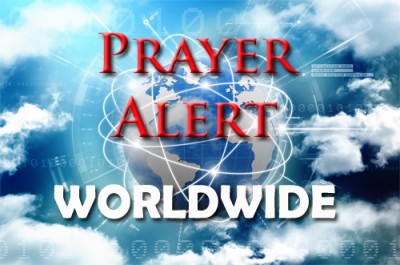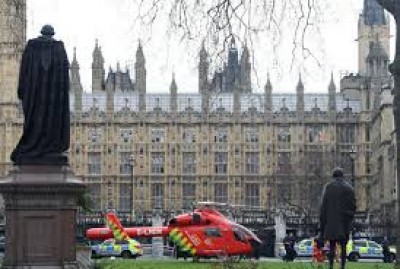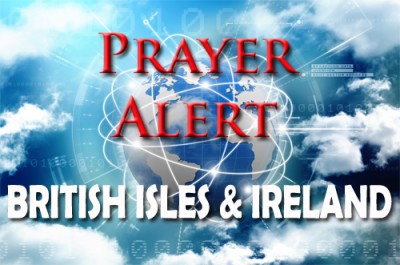Canada / USA: climate change and fuel
07 Apr 2017At a ‘creation care fair’ at St Cuthbert’s Church in Toronto, Anglicans and community members had opportunities to ask church and secular leaders how they were responding to the challenge of climate change, with many questions about whether or not the Anglican Church of Canada will divest from fossil fuel companies. Its General Synod will be making a decision about this in 2019. While the Canadian Church and government address environmental challenges, President Trump signed an executive order to return to coal fuel. The order directs the US Environmental Protection Agency to begin re-evaluating immediately the Clean Power Plan that was published just ahead of the 2015 UN Climate Change Conference in France. The Plan was to reduce US power plant emissions dramatically over 25 years, and was a bargaining tool when negotiating the Paris climate accord. See:
Healing the Land
05 Apr 2017Teaching and prayer days - May 2017
We invite you to join us as we welcome Alistair and Marie Petrie from Partnership Ministries to share their wide experience of seeing how healing the land can release evangelism and bring transformation to lives, communities, cities and nations.
Healing the land is intimately connected with people. What people think, do and say has a direct bearing on either the extension of the Kingdom of God or the resistance of others to it. Alistair’s book’s including Releasing Heaven on Earth and A Sacred Trust interactive workbook will be on sale at all venues
Working with our partners, South East Prayer Leaders Network and Community Watchman Ministries and with other UK leaders and members of the World Prayer Centre team, we hope to see representatives from many churches, networks, towns, cities and regions as possible to come so we can learn and be equipped how to pray more effectively. We believe the Petrie’s visit is timely. God is changing things in our nation and this is an opportunity to be equipped and engaged.
You can opt to register for days in Canterbury May 12-13, Liverpool 19-20 or Birmingham 23 May 2017. We do need you to register for the days in Liverpool and Birmingham – click here for full details.
How to pray with children
05 Apr 2017How to pray with children – some creative ideas
This year the dates for Thy Kingdom Come fall during the half term holidays for many schools in England.
It’s a lovely opportunity to take time to pray together as a family without rushing off to clubs and school commitments.
We’d like to introduce the amazing Kingdom Kit – to help families pray at home together. This will guide you and your family with a daily prayer prompt and activity. Everything you will need to follow the suggestions is included in the pack from mustard seeds, keyrings and balloons to smarties and bookmarks.
Also available is our Family Creative Prayer Journal and the Thy Kingdom Come Bright Prayer Ideas for Families at home. https://www.cpo.org.uk/thykingdomcome
Download the Kingdom Kit
https://www.thykingdomcome.global/search/resources?tags=3&theme_id=34
Or order https://www.cpo.org.uk/product.aspx?prod=C5229GT&cat=3745
Pray protection for our nation
05 Apr 2017Westminster
It is shocking to see how easy it is for one person to create so much carnage! As we have all seen recently with the attack in Westminster. We need to remain vigilant in prayer in the days ahead.
Please pray:
1) Every person plotting to cause death and destruction will be exposed before they get anywhere near their target.
2) For the police and security services to be in the right place, at the right time, watching the right people to foil every plan of the enemy.
3) Our enemy is not the flesh and blood but the principalities and powers. In prayer lift the flesh and blood into God's presence and pray for their salvation.
Ghost Ships
On 10th March Sky News covered an issue of Ghost Ships where vessels on our coast lines are suspected of turning off their GPS devices to avoid being tracked by the authorities. See http://news.sky.com/story/questions-over-ghost-ships-sailing-under-the-radar-10797433 for more information.
Please pray:
1) There will be no collisions.
2) Every vessels attempting to slip into our waters unrighteously will be exposed.
Stop domestic violence
05 Apr 2017We have been told by the Police that there are greater dangers in our nations from domestic violence than terrorism. Yet it still remains such a hidden danger.
According to the Office of National Statistics 1.8 million adults between 16 to 59 said they were a victim of domestic abuse in the last year to March 2016. 1 in every 10 crimes reported are domestic violence...but that will only be the tip of the iceberg as many people do not report domestic violence.
Much domestic violence can be due to drug or alcohol addictions and mental health problems.
Pray that:
1) The victims will have the courage to seek help
2) The perpetrators will get help to deal with their anger in a healthy way.
3) The children who often witness the violence or are victims of the violence themselves. They often grow up to be victims or perpetrators themselves if the pattern is not broken.
Source: Coastlands & Gateways
The power of dreams
31 Mar 2017Ex-Muslim Nabeel Qureshi has asked for prayers as he undergoes chemotherapy for cancer and struggles to eat. In his post he also said he saw Jesus in a dream. ‘It's something that I have never seen before. A lot of people who leave Islam and become Christians do so because they have seen Jesus in a dream or a vision. I received dreams and visions when I was seeking God, and I saw things that led me to the Gospel. Later, I was thrilled to see Jesus in a dream. I had been praying for it. I had been asking for guidance and I think I got some.’ To read his story and find out about his unusual prophetic act, click the ‘More’ button.
Cuba was an atheist country during the Castro era. In 1960 Rev Naranjo spent two years in a labour camp for his evangelical preaching. Now, his church is full of life with 200 worshippers on Sundays, providing clinical care for disabled children and hosting a Bible study group. Across Cuba tens of thousands gather for evangelical worship every week even though the government still doesn't allow religious groups to construct their own houses of worship and have demolished church buildings. Presbyterian pastor Joel Ortega Dopica said, ‘There's a revival of churches of diverse denominations; all of them are growing, not just in the number of members, but in their capacity to lead and act in society'. Dopica is the president of the Council of Churches of Cuba, an official association of 32 Protestant denominations.
Friday Focus: unity in prayer and mission
31 Mar 2017The Apostle Paul refers to himself and his brothers and sisters in Christ as ‘co-workers’ with God. If communicating the gospel of Jesus Christ is a task, the team to accomplish that task is the Church. If the team doesn’t pull together the job won’t get done. Pray for the Church across Britain, that we will work together with great effectiveness to complete the task of sharing Jesus with every man, woman and child in this land.
(Lyndall Bywater, Salvation Army)







